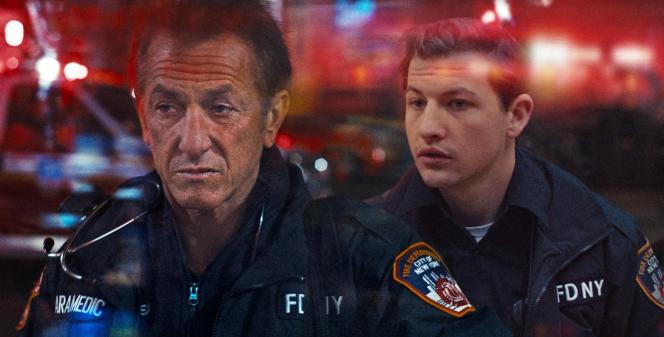‘Black Flies’ Review: Thinks It’s More Real Than It Is
In “Black Flies,” a movie that keeps working to get high on its own intensity, Sean Penn and Tye Sheridan play paramedics who spend their nights driving through hell (I mean, Brooklyn). There are countless shots of the two in their EMS van, riding along under the tracks of an overhead subway train — the exact kind of grungy Brooklyn boulevard that Popeye Doyle went smashing through in the famous “French Connection” car/subway chase. As Rut (Penn) and Cross (Sheridan) patrol the borough neighborhood of Brownsville, one of the poorest and most crime-ridden sections of New York City, those overheard tracks become part of the film’s meticulously oppressive visual design. The two have so little breathing room they can barely see the sky. After a while, though, you start to think: Don’t these guys ever drive down a side street? Like everything else in “Black Flies,” those subway tracks are stylish signifiers of doom that are a little too in-your-face.
The whole idea of a screw-tightening thriller about parademics sounds, on paper at least, like a recipe for riveting drama. The two partners are kind of like cops, bouncing from one trauma to the next. At any moment, a rescue situation could be life-or-death. And the demands of the job are such that high stress becomes the very engine of the movie’s momentum.
In 1999, when Martin Scorsese reteamed with screenwriter Paul Schrader to make “Bringing Out the Dead,” with Nicolas Cage as their ambulance-driving tour guide through the existential apocalypse, that’s certainly the sort of thing they were going for. But the movie turned out to be an overcalculated, undercooked retread of “Taxi Driver.” Far superior was “Broken Vessels,” a low-budget indie version of the same premise that came out just a few months before “Bringing Out the Dead.” It starred Jason London as the EMS newbie and Todd Field — yes, the director of “Tár,” back when he was still an actor, and a very good one — as the jaded heroin-smoking veteran of triage who administers health care with the efficiency of a professional assassin.
Few saw or remember “Broken Vessels,” and “Bringing Out the Dead” is not a Scorsese film that even many Nicolas Cage fans have gone back to, but “Black Flies” draws heavily on both movies. Penn is playing a kind of archetypal fusion of the Cage and Field characters: a man who knows all the angles and protocol shortcuts, and wants to save people, but is also a kind of underground thrill junkie, one who has seen so much misery and death that he scarcely even knows anymore whether he’s a lifesaver or an undertaker. Penn is an old pro when it comes to a role this one. He plays Rut (short for Rutkovsky) with haggard features and a lean-and-mean manner, plus a thousand-yard stare that has burned through every daydream; Rut can no longer see the light at the end of the tunnel. With an ex-wife who’s about to move their young daughter upstate, he’s a man whose life has turned to crud.
Cross, on the other hand, is working to get into medical school (that’s why he lives in a rathole in Chinatown), and Tye Sheridan plays him as a fresh-faced idealist who, of course, is going to have his illusions knocked away. Sheridan gives a quiet, unfussy performance, though as he tries to keep up with Penn’s stoic Method moodiness, I’ve never wished more that Sheridan didn’t look like such a fusion of the young Brando, the young Paul Newman and Norman Mailer. Those associations just make it that much more glaring that there isn’t all that much going on behind his eyes.
“Black Flies” opens with Rut and Cross arriving at the scene of a shooting, as the victims gush blood from assorted wounds. That sets the stakes for the movie, which is not going to be about the valiant saving of heart-attack victims; it’s going to be about rubbing the audience’s nose in the violence and squalor of the inner city. Thugs and drug dealers and skinheads with tattooed noggins, a vicious dog, a domestic abuser who won’t let them treat the partner who’s sitting there with her eye swollen shut: The film is a free-floating nihilist carnival of social breakdown — watching it is like descending, circle by circle, into the Dostoevskian purgatory of pain.
After a while, though, you start to notice that “Black Flies,” as staged with maximum overwrought hand-held sensationalism by the French director Jean-Stéphane Sauvaire, has no plot at all. None! It’s just one lacerating if-it-bleeds-it-leads set piece after another. That, in a way, is why Sauvaire has to keep heightening the action, until he finally gets to splattered brains and a half-dead fetus drenched in HIV blood. If he didn’t go to extremes, the flatness of the movie’s design would start to crush the audience. But guess what? It does anyway.
The flamboyantly heavy, life’s-a-bitch-and-then-it-ends drama of “Black Flies” isn’t much fun to sit through, but I think that’s ultimately because the movie, for all its grungy surface authenticity, is a bit of a fake. It’s turning the lives of parademics into something far darker and more amoral than they really are. In a funny way, Sauvaire has made a movie that feeds into and exploits the Fox News vision of the world: all these violent people of color brutalizing everyone around them, with the two white saviors doing their best not to get dragged down into the muck. If you’re wondering whether the Sheridan character’s name is Cross because he’s supposed to be suffering like he was nailed to one…well, yes. “Black Flies” is the kind of movie that never met a signifier of the abyss it didn’t embrace.

